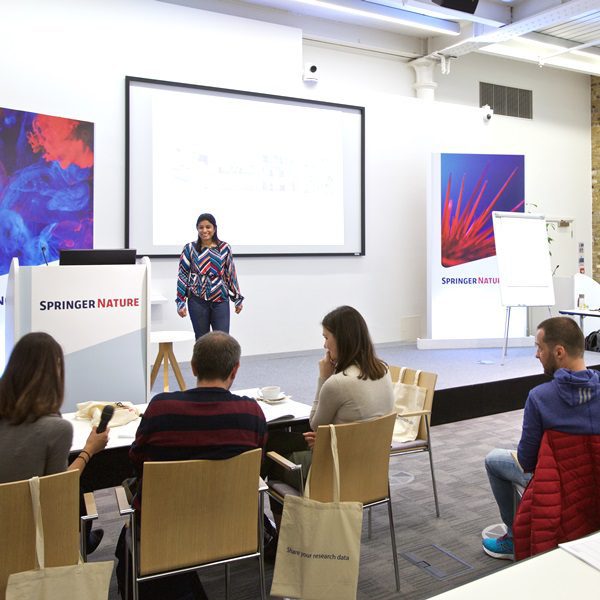While stakeholders including funding agencies and publishers increasingly require researchers to share their data openly, researchers are often unsure about data best practices. In a 2018 survey of 7,000 researchers, almost half said that they find organizing data a challenge, one third didn’t know where to share data, and 30% admitted to having lost data.*
This workshop focuses on best practices in research data management, including guidance on repository selection and metadata creation, approaches to sensitive data sharing, and an introduction to the FAIR principles for research data.
Support your researchers with research data training
- This workshop is currently unavailable at this time, apologies for any inconvenience
- Highly interactive with exercises, Q&A sessions and a workbook to keep
- Receive a post-workshop report containing researcher feedback. In 2019, 89% of have researchers have rated their workshop as excellent or good and 97% feel more confident in their skills
Institutions already benefiting from data training include Cancer Research UK, RMIT University, the International Development Research Centre (IDRC), and the University of Birmingham.
Create an agenda for your academy:
This virtual workshop consists of three to six modules, which can be scheduled for the days and times that suit your researchers best.
We recommend that every workshop begins with Module One: The Context for Data Sharing.
- Module 1: The Context for Data Sharing
This module provides the context for the Open Science and data sharing, and why it is important for researchers to share their data. The common drivers for data sharing, including institutional, funder and journal policies are covered, as well as the ways that data sharing requirements impact directly on researchers. Participants also learn how they can ensure compliance with the data policies which apply to them. The benefits to both researchers and to the wider researcher community are also discussed.
Then choose between 2-5 additional modules to build an agenda:
- Module 2: Allowing reuse and gaining credit for your research
In this module, external data sharing is considered. Copyright for data and data licensing options are reviewed and their value is described. The importance of data citation is discussed, and participants will prepare data citations based on best practice examples.
- Module 3: Data Publishing
In this module, the breadth of options for data publication are described. Participants will learn about publishing options for data papers and data journals, as well as the way metrics can be used to track use and citation of their data.
- Module 4: From Active Data to Archived Data
This module introduces the practical aspects of data sharing which researchers will need to understand before making their data openly available. The importance of metadata, and practical ways to capture it are discussed, as well as the necessity of storage and back-up while research is being conducted. Participants will also learn how to identify appropriate repositories for data sharing.
- Module 5: Practical Application of the FAIR Data Principles
This module gives an in-depth introduction to the practical applications of the FAIR Data Principles, a standard for data sharing which all researchers should be familiar with. The ways that researchers can apply the principles to their own data are discussed with contextual examples, as well as the relevance of these standards to all aspects of data infrastructure.
- Module 6: Sharing Sensitive Research Data
This module addresses challenges and techniques in sensitive data sharing. Participants will learn how to address the collection and dissemination of sensitive data, including preparation before their research begins. Techniques for anonymising or de-identifying data are also discussed, with reference to both qualitative and quantitative sensitive data.
“The workshop covered a lot of material in a way that was easy to understand and included active learning exercises to reinforce the concepts taught.” Researcher, Australia
*Stuart, D., Baynes, G., Hrynaszkiewicz, I., Allin, K., Penny, D., Lucraft, M., & Astell, M. (2018). Whitepaper: Practical challenges for researchers in data sharing.



